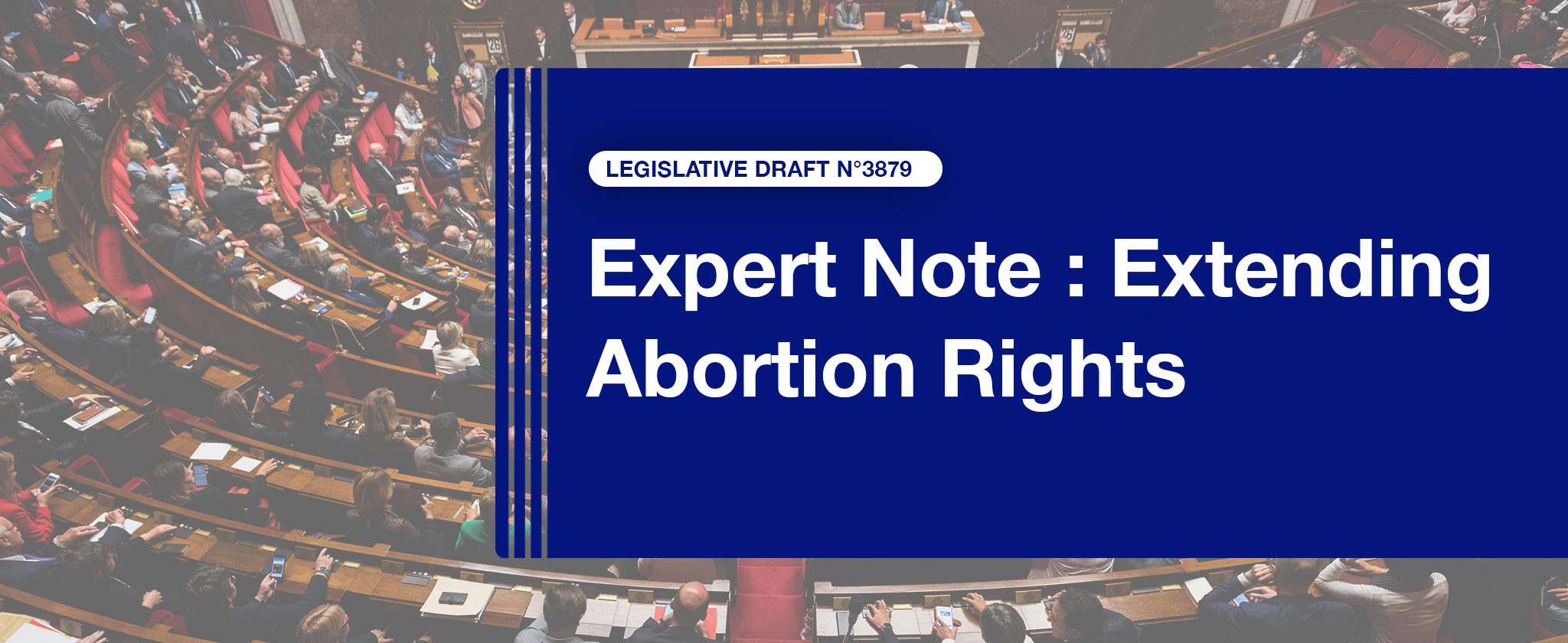
Analyzing French Bill # 3879 Extending Abortion Rights
by guilhem | November 25, 2021 | Abortion, News

Time for Evaluating Abortion in France
On 29 November, Bill # 3879 to extend abortion rights, tabled by Mrs. Albane GAILLOT, is scheduled for second reading at the French National Assembly. Claiming that access to abortion is becoming increasingly difficult today, the bill aims to extend legal deadlines from 12 to 14 weeks and abolish the conscience clause for healthcare professionals.
Additional measures aggravating the bill include:
- Extending the period of medically-induced abortion at home from 5 to 7 weeks of pregnancy (Alliance VITA addressed a request to the State Council regarding this subject);
- Allowing midwives to perform surgical abortions prior to 10 weeks of pregnancy;
- Abolishing the 48-hour reflection period between two abortion consultations, for psychosocial consultations (mandatory for minors);
Besides, the government is due to hand in two reports to the Parliament. These reports evaluate women’s access to abortion, and the way the abortion obstruction law is being applied.
After a record number of abortions in 2019, there were 222,000 abortions recorded in France in 2020. The Covid-19 crisis and the measures imposed by the government affected conception rates during the first lockdown, which led, in 2020, to a decrease in both natality and abortions.
The highest abortion rates are still observed in the 20-29 age group (25.7 abortions per 1000 for the 20–24-year-olds; and 27.1 per 1000 for the 25–29-year-olds), yet the statistics correlated by the DREES (Department of Research, Studies, Evaluation and Statistics) show that women in their thirties abort more frequently since the 2010s.
In France 232,200 abortions were performed in 2019, representing an increase in 3.5% compared to 224,300 in 2018. Women living in metropolitan France accounted for 217,500 of the abortions. Consequently, the abortion rate has reached its highest level since 1990: 16.1 abortions for every 1000 women aged 15 to 49.
The overall rates for 2019 were 15.6 abortions in metropolitan France and 28.2 in the overseas departments and regions (“DROM”), while the birth rate has been steadily declining since 2014.
These statistics prove that access to abortion has not been hindered. The French abortion rate is more than double that of Germany.
Furthermore, abortion is a distinctive marker of social inequality and this fact should challenge public authorities. When data on abortion were matched with income levels for the first time for tax year 2016, the statistics indicated that women with lower incomes resort to abortion more frequently than others.
Additionally on January 14, 2021, a survey published by the “UNAF” (National Union of Family Associations) revealed that on average the French would like to have one more child. They are stopped from doing so due to material and financial difficulties (necessity of getting a stable job, fixed and decent housing, etc.) Furthermore, it is difficult to balance family and work due to demanding schedules.
Finally, families receive less and less government assistance, resulting in significant budget cuts and an increase in the budget for housing.
Alliance VITA is convinced of the growing need for preventing abortion. They analyze the implications of the new bill, some of the latest developments in France, and put forward their recommendations.
1) Extending the legal abortion deadlines from 12 to 14 weeks of pregnancy
Refuting figures
The bill’s memorandum explains that “3,000 to 5,000 women go abroad for abortions, because they have passed the legal deadline in France”. Already in 2001, these same figures were used to extend abortion deadlines. These figures are not confirmed by Belgium and Spain, which are the countries performing abortions for French women.
According to the data reported on September 16, 2020, by the Delegation for Women’s Rights, estimates ranged from 80 to 1000 French women seeking an abortion beyond the legal deadlines in Spain, with a report of 810 having recourse to abortion in the Netherlands in 2018.
In December 2020, when the National Consultative Committee on Ethics published its recommendation on extending abortion from 12 to 14 weeks, it referred to its 2018 estimate of approximately 1500 and 2000 women who might exceed the legal delays. In 2018, 31 French women travelled to the UK for late-term abortions; 810 travelled to the Netherlands, (50% less since 2011 and constantly decreasing), and an estimated 250 in Spain for a total of about 1000. The CCNE refers to a study published in 2020 by Zordo et al. involving 204 women, (47 from France) who aborted in the UK, The Netherlands and Spain, at an average of 19 weeks pregnancy.
To date, there is no reliable study regarding the figures or the reasons why a number of women would go abroad for abortion. This important data could shed light on the possible flaws in public policies and foster a genuine prevention policy.
The COVID crisis did not cause late-term abortions.
While abortion activists used the Covid crisis to put pressure on public authorities to extend abortion deadlines in 2020, the latest DREES report on abortion statistics for 2020 does not show any lag in abortions over time.
“Performing an abortion at fourteen weeks of pregnancy is nothing but trivial.”
The bill’s explanatory memorandum states “there is no medical or scientific argument to justify opposing the extension of legal delays”. In fact, from a medical standpoint, the operation is more complex due to the larger size of the fetus.
The National Academy of Medicine voiced its opposition to extending abortion from 12 to 14 weeks: ” Extending this period to 16 weeks of amenorrhea [14 weeks of gestation], increases the use of surgical maneuvers which can be dangerous for women, and can cause a greater dilation of the cervix with long-term complications such as premature delivery.” For the academy, “this extension will inevitably lead to a significant increase in complications in the short or long term”.
The National College of Obstetrician Gynecologists of France (“CNGOF”) has, for its part, voiced reservations about the extension of the legal period of abortion from 14 to 16 weeks considering that “the type of surgery for an abortion is different between 14 and 16 weeks of amenorrhea “: “at 14 weeks, it is still possible to perform a vacuum aspiration abortion. At 16 weeks of amenorrhea, the cervix must be further dilated, with the inherent risk of creating permanent lesions, which can subsequently lead to premature deliveries,” says the College of Gynecologists-Obstetricians, mentioning the same complications as the Academy of Medicine. The College also believes that “beyond 14 weeks of amenorrhea, the necessary procedures can therefore cause complications for women and this could lead them to distrust the health professionals performing these abortions today.”
As president of the “CNGOF” Professor Nisand, emphasizes that this is not a trivial act. “Indeed, at 12 weeks a fetus is 85 mm long, from head to buttocks. A 14-week-old fetus is 120 mm long and the head has ossified. Which means that in order to remove the fetus from the mother’s belly, it has to be cut into pieces and the head crushed. Understandably, many healthcare professionals find this procedure quite upsetting.”
While the CCNE does not mention any medical objections to extending deadlines, it does recognize that the later the abortion is performed, the greater its psychological consequences for women as well as for their caregivers. Regarding the consequences, the site Ameli.fr specifies that “for pregnancies beyond 15 weeks of amenorrhea (or 13 weeks of pregnancy), treatments can be prescribed to facilitate the aftermath of childbirth and avoid the rise of milk”.
France is not lagging behind
On October 13, on France Info, the French Health Minister, Olivier Véran, declared France to be in 18th position out of 27 in Europe regarding abortion deadlines, making it lower than the European average. This statement was questioned in several articles:
“Extending the legal abortion period: Is France really lagging behind its neighbors?” on lci.fr
“Abortion: is France lagging behind on legal deadlines in Europe, as Olivier Véran claims?” on francetvinfo.fr
The bill doesn’t propose any assistance
Abortions performed after the legal deadline could be an indication of huge distress as well as a sign that the woman is experiencing pressure from society or from her entourage.
Undisputedly, pregnant women experiencing distress deserve to have society’s full and undivided attention. Others’ opinion can greatly influence whether a pregnancy is carried to term or not, especially when women are lacking support. Some women acknowledge experiencing heartbreak when aborting their unborn child due to their financial, emotional, or mental situation. Collectively we should ask ourselves how we can best practice solidarity. Distress must never be ignored. And the answer to distress is to fight against the root cause, to alleviate distress by providing women the support they need. Abortion should never be a foregone conclusion. For women it is actually very discriminatory and brutally aggressive.
Yet, this new bill which proposes to extend abortion deadlines, does nothing to propose any alternative choices or any specific support for women.
2) Abolishing the specific conscience clause for abortion
This bill abolishes the specific conscience clause. As it stands in the bill, the doctors and midwives who refuse to perform an abortion, must communicate the name of another practitioner, and this obligation only stands for doctors and midwives:
“A doctor or a midwife who refuses to perform an abortion must inform the woman concerned straightaway of his refusal and then immediately communicate the names of practitioners who can perform the abortion according to article L. 22122”.
Indeed, this leads to reversing the charges: not being compelled to perform an act is not the same thing as refusing to practice it. It is no longer a conscience clause.
According to the bill’s authors, there is a “double conscience clause”, one specific for abortion and the other of a general nature, in the doctor’s code of ethics (article R.4127-47). The two clauses would have the same scope and would concern all nursing staff. And so there would be one clause too many (Public Health Code article L2212-8), which should be deleted so that abortion would not be “stigmatized” compared to other medical acts.
This is a fallacious argument for at least four reasons:
1° The general clause existed prior to the Abortion Act of 1975. Therefore, if the legislature saw fit to introduce a specific clause when the law was voted, it is because doctors needed an additional protection, considering the scope of the act in question. Refusing to take a life is not the same as refusing to take care of a patient or refusing to prescribe some treatments.
2 ° The general clause of the doctor is of more limited scope. It begins with the following principle: “Whatever the circumstances, continuity of care for the sick must be ensured.” This principle limits the physician’s discretion in at least two circumstances mentionned in the text, “in cases of emergency and in cases where he fails in his obligations towards humanity”. This legal framework is in fact more restrictive and binding on the doctor than the solemn declaration that “a doctor is never obliged to perform an abortion”.
3 ° The general clause is not legislative in nature, but regulatory. This is a fundamental difference. A law provides a much better guarantee of freedom than a ministerial decree. A law can only be amended by another law enacted in Parliament, following debates, amendments, votes, possible censure by the Constitutional Council, etc. A decree can be amended overnight by the government, without any limitations from public opinion or elected officials. If the conscience clause in Public Health Code article L2212-8 is abolished, which is legislative in nature, then only that of article R.4127-47, which is regulatory in nature remains, which provides much less protection.
4 ° The general clause does not exist for all the other healthcare professionals. Admittedly, midwives do have a general clause similar to that for doctors (Public Health Code article R.4127-328), and for the nursing profession (article R.4312-12). But these general clauses, of a regulatory nature, have the same limitations and conditions as that of the doctor (refer to analyses 2 ° and 3 °). In addition, there are other professions that do not have a general clause and that could be involved, directly or indirectly, in abortion procedures, such as that of nursing assistants. Whereas, the specific abortion clause clearly states that “No midwife, nurse or paramedic, whomsoever, is obliged to assist in abortion.”
Indeed, a professional cannot be forced to act in formal contradiction to his conscience. This is a fundamental freedom for healthcare professionals who are required to act responsibly and in an informed manner. The CCNE also recalls that abortion is a “unique medical procedure” that justifies maintaining the specific conscience clause for health professionals, this bill’s other flagship measure. The Order of Physicians expressed its’ opposition to abolishing the specific conscience clause for abortion stating that “neither eliminating the conscience clause nor extending the legal deadlines […] are answers to the difficulties that our fellow citizens experience, even today, when electing to have recourse to an abortion”.
Removing this clause would be equivalent to treating health professionals as service providers, and thereby invalidate the specificity of these professions, and violate medical ethics. This would undermine the security of many professionals. Abolishing the freedom of conscience would also be discriminatory because some individuals would be forced to abandon their profession. It is a blatant attack on the freedom of speech and of the freedom of thought and goes against human rights.
1) Extending medically induced abortions at home from 5 to 7 weeks of pregnancy
Already extremely debatable, this provision authorized under the state of emergency must be revoked. This extended delay undeniably endangers women’s physical and psychological health by intensifying their pain and psychological suffering.
Medically induced abortion is often difficult to live with because the woman is alone faced with the pain from the expulsion of the fetus. Prescription painkillers are somewhat effective for relieving the pain, but isolation contributes to the psychological suffering. In 2014 the INSERM published a study which emphasized that “27% of women who had a medically induced abortion experienced very intense pain on the 3rd day of the abortion, and 83% of women reported taking painkillers for five days¹. Over 25% of women stated that the hemorrhaging due to the medication was worrisome”.
2) Midwives allowed to perform surgical abortions
Unlike physicians, midwives are neither trained, nor qualified to perform surgery. This issue raises obvious questions about the safety and the actual role of midwives. The French National Union of Gynecologists and Obstetricians (“Syngof”) has stated its’ opposition to midwives performing abortions: “Although it is simple and apparently generous to pass a decree conferring surgical competence to midwives, the training and experience for acquiring this competence are not and will not be met for a long time. Above all, it shows deceitfulness for midwives and dishonesty for women, while it does nothing to impact women’s access to abortion. »
On January 12, 2021, The National Academy of Medicine also declared it opposition in its Ethics Committee Recommendation.
3) Abolishing the 48-hour delay between consultations, in case of psychological consultation (mandatory for minors)
The January 26, 2016, Health Act abolished the 7-day reflection period between the first abortion consultation and the second during which the woman had to submit a written request. However, the law provides that an additional preliminary interview must be systematically offered “during which assistance or advice appropriate to the situation of the person concerned is provided” (art. 2212-4 of the Public Health Code). This interview is mandatory for minors. A period of two days has been maintained for all women who follow this preliminary interview, before submitting the written request for abortion.
Since abortion is an act that deals with the destiny of a human life, the removal of this 2-day reflection period, which is already very short, is hitting women hard, especially young minors. By comparison, the law requires 2 weeks of reflection before cosmetic surgery.
Allowing this provision would seriously infringe on a woman’s freedom with the inherent risk of heedlessly and hastily opting for an abortion after the preliminary consultation, without the safeguard of thoughtful reflection.
- IV) Do we really need to change the legislation?
Since 1975, legislators have constantly worked to extend the abortion law.
- 1975: so-called “Veil” law: enacted for 5 years on an experimental basis
- Abortion for “distress” (up to 10 weeks of pregnancy),
- Abortion for medical reasons, if the pregnancy seriously endangers the woman’s health or if there is a high probability that the unborn child will have a particularly serious condition (no delay period, up until birth).
- 1979: 1975 law renewed on a permanent basis
- The promise to set up commissions for maternity assistance is abandoned.
- 1982: law established for abortion to be reimbursed by Social Security (state health insurance).
- 1993: law known as “Neiertz” establishes an “offence to the obstruction of abortion”.
- 2001: so-called “Aubry” law:
- Legal period for abortion extended from 10 to 12 weeks of pregnancy,
- Compulsory preliminary interview abolished, except for minors,
- Parental authorization for minors abolished
- Right to conscientious objection for department heads abolished
- Medical abortion (by RU 486, “morning-after pill”) allowed “at home” by approved city doctors,
- Advertising for abortion authorized
- 2007: Prescriptions authorized for medical abortion “at home” by health centers and approved family planning or education centers (CPEF).
- 2012: 50% increase for “abortion packages” paid to Health Centers
- 2013: Abortion 100% reimbursed by Social Security.
- 2014: Gender Equality Act:
- The notion of distress for abortion is deleted,
- Offence of the obstruction to abortion extended to include access to information,
- National Assembly passes a resolution to reaffirm the “fundamental right to abortion”.
- 2015: “Health” Law:
- The one-week cooling-off period for abortion is abolished,
- Midwives allowed to practice medically induced abortions,
- Health Centers allowed to perform surgical abortions,
- Regional action plans created for access to abortion.
Throughout these successive revisions in the abortion law, there has never been any evaluation or epidemiological study on the causes and consequences of abortion, an act which can never be considered trivial.
The real priority is to protect women from all forms of violence, including against the pressure to abort against their will. Women often experience pressure to abort from men, – but society also exerts pressure on vulnerable women pushing them to abort reluctantly.
In October 2020, an IFOP survey revealed that 92% of the French people surveyed believe that abortion leaves psychological scars that are difficult for women to live with and 73% believe that society should do more to help women avoid recourse to abortion.
For theses reasons, Alliance VITA is calling for :
-
- Halting new legislation,
- conducting an epidemiological study covering the last 20 years, to analyze the causes, conditions, and consequences of abortion,
- implementating a genuine abortion prevention policy
- to provide women with support and personal accompaniment,
- to provide women with more balanced information when faced with an unplanned pregnancy, especially regarding the specific aids and maternity benefits.
- to upgrade government policies for the family, including appropriate measures that enable young women to better reconcile family life, education, and professional life.





![[Press Release] Alliance VITA’s Response to the 2021-2024 Palliative Care Plan](https://www.alliancevita.org/wp-content/uploads/2017/12/soinspalliatifs-1-1080x675.jpg)
